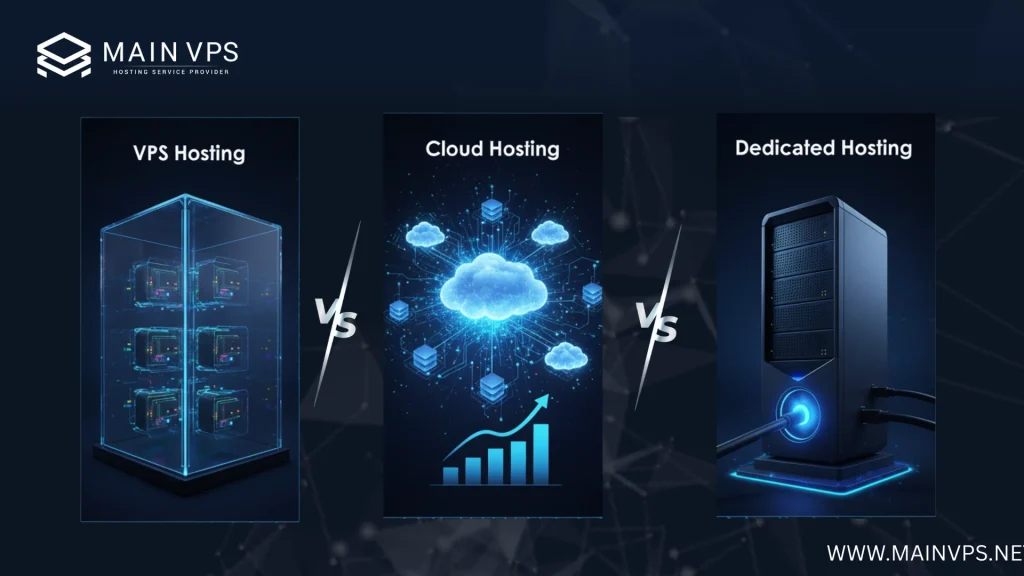
When I first started working with servers, the choice was simple. If you were on a tight budget, you would pick shared hosting. If you needed full control and raw performance, you invested in a dedicated server. That was the standard conversation for many years.
As we move closer to 2026, hosting decisions have become far more complex.
Today, developers, startup founders, SaaS teams, and growing mid-sized businesses are all asking the same question:
VPS Hosting vs Cloud Hosting vs Dedicated Hosting — which option makes the most sense?
On the surface, these hosting types often sound interchangeable. Every provider promises speed, uptime, security, and scalability. However, in real-world usage, the differences become very clear, especially when traffic spikes, budgets tighten, or performance issues start to affect users and revenue. The hosting choice you make can directly influence your application’s stability, long-term costs, security posture, and how easily you can scale when growth suddenly accelerates.
I’ve had the opportunity to work hands-on with all three hosting models over the years. I’ve deployed small Laravel and WordPress projects on VPS servers, where flexibility and cost-efficiency mattered most. I’ve relied on cloud hosting to manage unpredictable eCommerce traffic during major sales campaigns, where auto-scaling and redundancy were critical. And I’ve managed dedicated servers for high-traffic video platforms, where raw performance, consistent throughput, and complete hardware control were non-negotiable.
Each option has its strengths and its limitations. What looks perfect on a comparison chart doesn’t always feel perfect when you’re troubleshooting a slow database at midnight or dealing with a sudden traffic surge. Some environments are easier to manage on a day-to-day basis, while others demand deeper technical expertise but reward you with unmatched performance and control.
In this guide, I won’t just explain VPS Hosting vs Cloud Hosting vs Dedicated Hosting in technical terms. I’ll share what it’s actually like to use each option in real production environments, which hosting model truly works best for, and the practical lessons I’ve learned from deploying and maintaining applications at different scales. By the end, you’ll have a clear understanding of which hosting solution fits your current needs and which one will support your growth in the years ahead.
What VPS Hosting Feels Like (The Developer’s Playground)
A VPS (Virtual Private Server) is like renting your own apartment in a big building. You’re sharing the building (the physical server) with others, but inside your space, you decide the furniture, the paint, the locks, everything.
When I first moved a client’s project from shared hosting to a VPS, the difference was night and day. Suddenly, I had root access. No more emailing the host just to install an extension. I could tweak PHP, set up firewalls, and optimize MySQL myself.
Why Developers Love VPS:
- Control: Full root access means you can install anything, from Docker to Redis.
- Performance: Your slice of CPU and RAM is reserved. No noisy neighbors slowing you down.
- Affordable scaling: Need more power? Upgrade your plan without moving servers.
Who VPS is Best For:
- Freelancers or small agencies hosting multiple client sites.
- Startups running MVPs or SaaS apps.
- Developers who want control but don’t want to pay enterprise-level bills.
Pro insight: VPS hosting is the “sweet spot” for most developers I know. It’s budget-friendly but still gives you the freedom to build real systems without compromises.
What Cloud Hosting Feels Like (The Safety Net You Didn’t Know You Needed)
Cloud hosting is a different beast. Instead of being tied to one machine, your website or app lives across a network of servers. If one server dies, another picks up instantly. That’s why the cloud feels like having a safety net under your project at all times.
I remember working with an e-commerce brand that saw traffic triple overnight during a viral TikTok campaign. On a VPS, that site would’ve slowed to a crawl. But on cloud hosting? It scaled up automatically. Users never saw a hiccup.
Why Businesses Love Cloud:
- High availability: Hardware failure doesn’t mean downtime.
- Scalability: Traffic spikes? Resources expand automatically.
- Pay as you go: Ideal if your usage fluctuates.
Who Cloud is Best For:
- SaaS platforms with unpredictable growth.
- Online stores are running seasonal or viral campaigns.
- Businesses that cannot afford downtime.
Pro insight: Cloud hosting is less about control and more about peace of mind. It’s like knowing there’s always a backup plan, even if your site goes viral in the middle of the night.
What Dedicated Hosting Feels Like (Owning the Whole Building)
If VPS is an apartment and cloud is a network of safety nets, then dedicated hosting is like owning the entire building. Every resource, CPU, RAM, and storage, belongs to you.
The first time I set up a dedicated server was for a video streaming startup. The workload was hard: hundreds of concurrent viewers, heavy storage requirements, and zero tolerance for lag. With a dedicated machine, we had raw power and total control.
Why Enterprises Love Dedicated Servers:
- Unmatched performance: No shared resources, no compromises.
- Customizability: From kernel settings to RAID arrays, you control it all.
- Security isolation: Perfect for sensitive or regulated workloads.
Who is Dedicated Best For:
- Enterprises with massive traffic.
- AI workloads, databases, or video platforms.
- Organizations that need compliance (finance, healthcare, etc.).
Pro insight: Dedicated hosting is overkill for most small businesses. But when you hit scale, or you’re working on mission-critical apps, it’s worth every penny.
VPS vs Cloud vs Dedicated Hosting — The Real-World Tradeoffs
Here’s how I’d sum it up from hands-on experience:
| Feature | VPS Hosting | Cloud Hosting | Dedicated Hosting |
|---|---|---|---|
| Performance | Reliable, but limited by your slice | Dynamic, adjusts to demand | Raw power, top tier |
| Scalability | Manual upgrades | Automatic scaling | Hardware-dependent |
| Cost | Affordable ($) | Flexible ($$–$$$) | Premium ($$$) |
| Control | Full root access | Limited (depends on provider) | Absolute control |
| Best For | Developers, SMBs, startups | SaaS, eCommerce, growth apps | Enterprises, heavy workloads |
How to Decide in 2026 (My Honest Take)
Here’s the decision framework I use when advising clients:
- Start with VPS hosting if you’re a dev, freelancer, or small business. It’s the most cost-effective and gives you real control.
- Go cloud if uptime and scalability are non-negotiable. SaaS apps, eCommerce stores, and platforms with unpredictable traffic fit here.
- Invest in dedicated only if you truly need heavy-duty performance or compliance. Otherwise, you’ll pay for horsepower you won’t use.
Pro tip: Don’t overbuy on day one. Start small (VPS), validate your project, then scale to cloud or dedicated when the workload demands it.
Final Thoughts
Choosing between VPS, cloud, and dedicated hosting isn’t about picking “the best,” it’s about picking the right tool for your current stage.
- VPS is your control + affordability option.
- Cloud is your scalability + peace of mind option.
- Dedicated is your raw power + full ownership option.
I’ve seen too many businesses waste money on dedicated servers when a VPS would’ve been perfect, or struggle on a VPS when cloud hosting could’ve saved them during traffic spikes. The trick is to start where you are and upgrade when your business justifies it.
FAQs — VPS vs Cloud vs Dedicated Hosting
Q1: Which hosting is best for developers?
VPS hosting. It balances affordability with root-level control.
Q2: Is cloud hosting always better than VPS?
Not always. Cloud shines for scalability and uptime, but VPS often delivers better value for predictable workloads.
Q3: Can I switch from VPS to cloud later?
Yes. Many teams start with VPS and migrate once they outgrow it.
Q4: Do I need dedicated hosting for WordPress?
Only if you’re running a huge site or a network of sites with high traffic. For most WordPress projects, a VPS or cloud is enough.
Q5: Which is the cheapest option?
VPS hosting is the most budget-friendly without sacrificing too much control or performance.
Q6: Which hosting option offers the best performance?
Dedicated hosting delivers the most consistent performance because all server resources are reserved for a single user. That said, a well-optimized VPS or cloud setup can perform exceptionally well for most applications.
Q7: What’s the most cost-effective hosting for startups?
VPS hosting is usually the best starting point. It offers predictable monthly costs, solid performance, and enough flexibility to grow without the complexity or higher pricing of cloud infrastructure.
Q8: Is cloud hosting more secure than VPS or dedicated servers?
Cloud platforms are generally very secure, but security depends more on configuration than hosting type. A properly hardened VPS or dedicated server can be just as secure as cloud hosting when managed correctly.
Q9: Which hosting is easiest to manage without a DevOps team?
Cloud hosting (especially managed cloud services) is often the easiest for small teams. It reduces the need for manual scaling, backups, and failover planning, allowing teams to focus more on development.
Q10: When should I upgrade from VPS to dedicated hosting?
You should consider moving to a dedicated server when your workloads consistently max out VPS resources, require specialized hardware, or demand guaranteed performance without any resource sharing.
If you’re exploring hosting options based on region, we’ve got detailed guides for you, too. Check out our VPS Hosting in India for affordable, developer-friendly setups close to home, or explore VPS Hosting in the USA if you’re targeting global audiences with low-latency performance. And if your project demands raw power, take a look at our Dedicated Server India and Dedicated Server USA pages to see which enterprise-grade solution best fits your needs.





